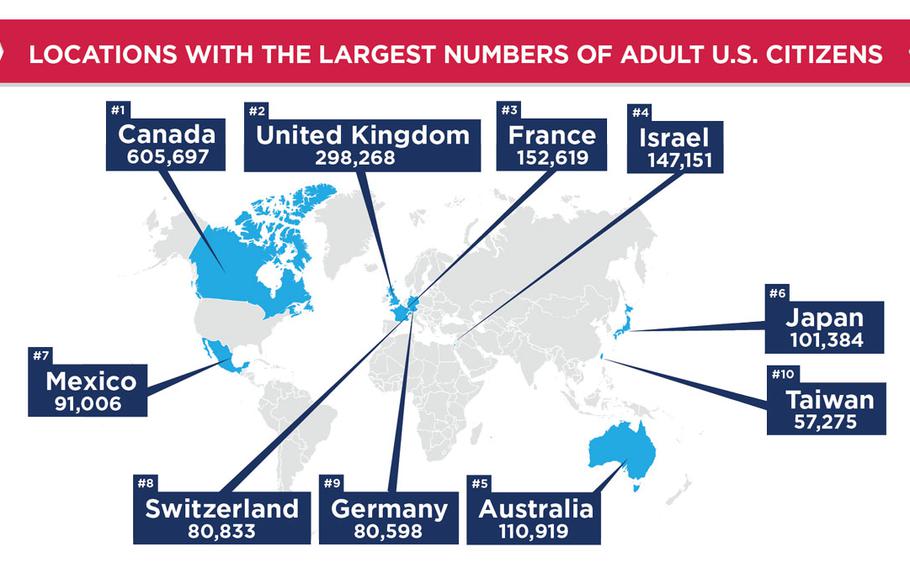
As of 2022 there are about 2.8 million eligible overseas U.S. voters, the majority of whom reside in the U.K. or Canada, according to Federal Voting Assistance Program, which created this graphic. (Federal Voting Assistance Program)
A federal judge in Pennsylvania on Tuesday threw out a lawsuit brought by six Republican congressmen from the state that sought stricter scrutiny of ballots from overseas, including from members of the military stationed abroad.
The lawmakers claimed in their lawsuit that because local election officials in Pennsylvania are not required to verify the identity or eligibility of voters who register overseas, those ballots are vulnerable to fraud. They wanted election officials to be required to set aside those ballots and not count them until voter eligibility can be determined.
Judge Christopher Conner, who was appointed to the federal bench by President George W. Bush, dismissed the case on several grounds, including that the members of Congress lacked standing and filed the lawsuit too close to the election. The judge said the lawsuit’s claims of “vote dilution” is “wholly speculative and legally inadequate,” as is the lawmakers’ assertion that overseas ballots harm their electoral prospects.
Conner noted that the plaintiffs had each “successfully sought federal office several times” under the current rules and that they “provide no good excuse for waiting until barely a month before the election to bring this lawsuit.”
The decision in Pennsylvania followed other failed Republican efforts in North Carolina and Michigan to challenge the legitimacy of overseas ballots. The Republican National Committee filed lawsuits in those two battleground states alleging that the states allow “overseas citizens who never lived in either state to illegally vote.” Both states allow people born to parents who were previously legal state residents to cast ballots. Judges in both states rejected the Republican efforts to disqualify those overseas ballots.
The trio of lawsuits enraged many members of the military, who had been an exception in Republicans’ attacks on mail-in ballots. Military members called it a betrayal of those who serve the country overseas. The Pennsylvania case was seen as especially alarming because it targeted all overseas ballots and was filed in federal court, meaning it could have had broader national implications.
The Republican attack on overseas ballots is part of a larger legal strategy targeting voting by mail. Republicans have filed dozens of lawsuits against mail-in ballots, seeking to have otherwise valid votes thrown out over mistakes like forgetting to seal the secrecy envelope or misdating the outside envelope.
This week, the RNC asked the U.S. Supreme Court to intervene in one Pennsylvania case in which a judge ruled that voters are allowed to cast a provisional ballot if they make a mistake on their mail-in ballot. Republicans have argued those voters shouldn’t be allowed to vote provisionally.
Voting rights advocates say the flurry of GOP-led lawsuits are a brazen attempt to sow doubt in the election. The effort to undermine overseas ballots is also tied to Republicans’ unfounded allegations that noncitizens want to vote in the presidential election.
The six GOP congressmen who brought the Pennsylvania case are: Reps. Guy Reschenthaler, Dan Meuser, Glenn Thompson, Lloyd Smucker, Mike Kelly and Scott Perry. All voted not to accept Pennsylvania’s electoral votes on Jan. 6, 2021, despite the lack of evidence of widespread fraud.